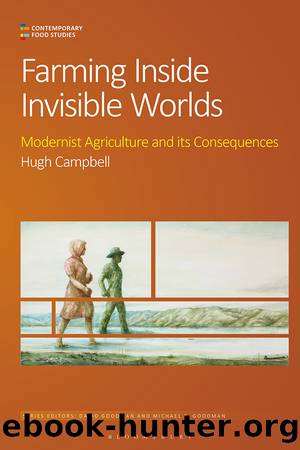Farming Inside Invisible Worlds by Hugh Campbell

Author:Hugh Campbell [Campbell, Hugh]
Language: eng
Format: epub
ISBN: 9781350120549
Barnesnoble:
Publisher: Bloomsbury Academic
Published: 2020-09-03T00:00:00+00:00
4
The crisis of modernist farming
The overarching theme of the past two chapters has been a characterization of the rising trajectory of a modernist farming world. In part, this rising trajectory was built on a continual process of rendering invisible and erasing other ontologies of land and land-use. Emerging out of its role in the colonization of New Zealand, the pastoral family farm stabilized and became the hegemonic form of land-use. This chapter turns towards the second half of that trajectory, as disruption and disarray begin to erode the great citadel of modernist farming. When faced with monolithic worlds, in which all negotiations of powers, inequity and even reality have cooled into a seemingly immovable mass, how can things change? What happens that makes the invisible visible again, renders unthinkable things thinkable and opens up the possibility of alternatives?
The long and stable regime of modernist agriculture remained a firm fixture in New Zealandâs political, economic and cultural life for over half a century, but seemingly entered a period of crisis and destabilization in the space of just one day. On 1 January 1973 Britain entered the European Common Market. This moment signalled the termination of long-term trading relationships with ex-colonies like New Zealand and ended a system of external trade networks that had been operating since the mid-1800s (particularly since 1882). Trouble had lurked below the surface for a while.
As the previous chapter described, the golden age of stability, prosperity and cultural hegemony in pastoral family farming was built on immense ecological contradictions, rendering indigenous worlds invisible, a reliance on one major market, a small suite of products, an uncurious approach to marketing of food exports in favour of productivist rationalities, a mechanistic and technical approach to farming systems, and a level of cultural consent for pastoral family farming that was homogeneous on the surface but had deeper undercurrents of unease. The first day of January 1973 is a single date that made visible many transitions that were either already underway or about to unfold in multiple aspects of farming worlds.
Orthodox accounts of the subsequent trauma for New Zealand farming identify 1973 as the commencement of a period of political crisis that rolled through the 1970s, eventually escalating into an economic crisis that was then intensified through the implementation of radical neoliberal reforms after 1984. For the farming community, this period became known as the ârural downturnâ, a distinct end-point to the golden age of New Zealand farming.
This chapter will traverse this important period of disruption and crisis for New Zealand farming, then consider both the fractures and disruptions that became evident after the crisis, along with one important area where some farming worlds have continued to elaborate a distinctly modernist ontological character. I will briefly review accounts of the crisis which, grounded in radical political economy, saw the crisis as symptomatic of wider crises of late capitalism and a changing relationship between the state, the economy and the agriculture sector. While radical political economy opened up new lines of critique
Download
This site does not store any files on its server. We only index and link to content provided by other sites. Please contact the content providers to delete copyright contents if any and email us, we'll remove relevant links or contents immediately.
Craft Beer for the Homebrewer by Michael Agnew(18237)
Marijuana Grower's Handbook by Ed Rosenthal(3677)
Barkskins by Annie Proulx(3367)
Project Animal Farm: An Accidental Journey into the Secret World of Farming and the Truth About Our Food by Sonia Faruqi(3212)
Red Famine: Stalin's War on Ukraine by Anne Applebaum(2928)
The Plant Messiah by Carlos Magdalena(2927)
0041152001443424520 .pdf by Unknown(2843)
Organic Mushroom Farming and Mycoremediation by Tradd Cotter(2688)
In the Woods by Tana French(2587)
Beer is proof God loves us by Charles W. Bamforth(2453)
7-14 Days by Noah Waters(2409)
Between Two Fires by Christopher Buehlman(2314)
Borders by unknow(2303)
Reservoir 13 by Jon McGregor(2300)
Meathooked by Marta Zaraska(2256)
The Art of Making Gelato by Morgan Morano(2254)
Birds, Beasts and Relatives by Gerald Durrell(2217)
The 7 Habits of Highly Effective People: Powerful Lessons in Personal Change (25th Anniversary Edition) by Covey Stephen R(2189)
The Lean Farm Guide to Growing Vegetables: More In-Depth Lean Techniques for Efficient Organic Production by Ben Hartman(2134)
